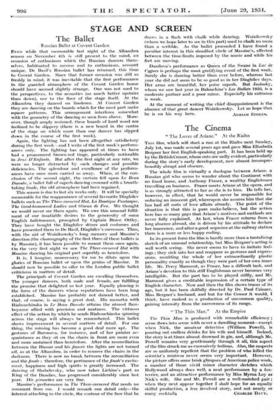The Cinema
" The Loves of Ariane." At the Rialto THIS film, which will start a run at the Rialto next Sunday, July 1st, was made several years ago and gave Miss Elisabeth Bergner her first English-speaking part. It has been held up by the British Censor, whose cuts are sadly evident, particularly during the story's early development, now almost incompre- hensibly abrupt and obscure.
The whole film is virtually a duologue between Ariane, a Russian girl who seems to wander about the Continent with no fixed home, and Anthony Fraser, a wealthy Englishman travelling on business. Fraser meets Ariane at the opera, and is as strongly attracted to her as she is to him. He tells her, however, in effect, that he would never be responsible for seducing an innocent girl, whereupon she assures him that she has had all sorts of love affairs already. The point of the situation is that this is pure make-believe, but the action here has so many gaps that Ariane's motives and methods are never fully explained. At last, when Fraser returns from a long absence abroad, she is driven by his attitude to declare her innocence, and after a good sequence at the railway station there is a more or less happy ending.
In its present form the film is hardly more than a tantalizing sketch of an unusual relationship, but Miss Bergner's acting is well worth seeing. She never seems to have to imitate feel, ings ; they sink into her and reappear as gestures and expres- sions, moulding the whole of her extraordinarily plastic personality exactly as though they were part of her own inner life. Mr. Percy Marmont, as Fraser, has a difficult task, and Ariane's devotion to this stiff Englishman never becomes very intelligible. But the part has to be played stiffly, and Mr. Marmont gives a creditable impression of a certain type of English character. Now and then the film shows traces of its age, but it has been skilfully directed by Dr. Paul Czinner, Miss Bergner's husband, and but for the Censor, it would, I think, have ranked as a production of uncommon quality, gaining intensity from the narrowness of its range.




































 Previous page
Previous page